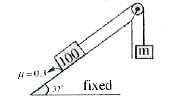The minimum number of unequal forces in a plane that can keep a particle in equilibrium is
4
2
3
6
The correct Answer is:C
To solve the problem of determining the minimum number of unequal forces in a plane that can keep a particle in equilibrium, we can follow these steps:
1. Understanding Equilibrium:
A particle is in equilibrium when the net force acting on it is zero. This means that all the forces acting on the particle must balance each other out.
2. Considering Forces:
Let's denote the forces acting on the particle as F1,F2, and F3. For the particle to be in equilibrium, the vector sum of these forces must equal zero:
F1+F2+F3=0
3. Using Two Forces:
If we consider two forces, say F2 and F3, they can be equal in magnitude but opposite in direction to balance F1. However, the question specifies that the forces must be unequal.
4. Applying Three Forces:
To satisfy the condition of having unequal forces while still achieving equilibrium, we can apply one force F1 and two other forces F2 and F3 such that:
F1=F2+F3
Here, F2 and F3 must be unequal in magnitude but their vector sum must equal F1.
5. Conclusion:
Therefore, the minimum number of unequal forces required to keep a particle in equilibrium is three.
Final Answer:
The minimum number of unequal forces in a plane that can keep a particle in equilibrium is three.
---
A particle is in equilibrium when the net force acting on it is zero. This means that all the forces acting on the particle must balance each other out.
Let's denote the forces acting on the particle as F1,F2, and F3. For the particle to be in equilibrium, the vector sum of these forces must equal zero:
F1+F2+F3=0
If we consider two forces, say F2 and F3, they can be equal in magnitude but opposite in direction to balance F1. However, the question specifies that the forces must be unequal.
To satisfy the condition of having unequal forces while still achieving equilibrium, we can apply one force F1 and two other forces F2 and F3 such that:
F1=F2+F3
Here, F2 and F3 must be unequal in magnitude but their vector sum must equal F1.
Therefore, the minimum number of unequal forces required to keep a particle in equilibrium is three.
The minimum number of unequal forces in a plane that can keep a particle in equilibrium is three.
Similar Questions
Knowledge Check
Can a couple pair of forces keep the body in equilibrium?
AYesBNoCdata is not givenDNone of the above
Four forces acting on a particle keep it in equilibrium, then :-
View SolutionThe minimum value of mass m for which the 100 kg block can remain in static equilibrium is

View SolutionWhat are minmum number or unequal fores whose vector sum is zero ?
View SolutionA body under the action of five forces (in x-y plane) can be in equilibrium only if
View SolutionWhich of the following sets of forces acting simultaneously on a particle keep it in equilibrium?
View SolutionThe minimum number of vector having different planes which can be added to give zero resultant is
View SolutionInternal forces acting within a system of particles can alter
View Solution
